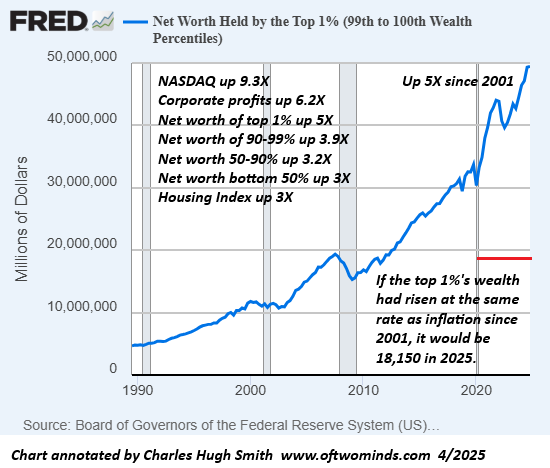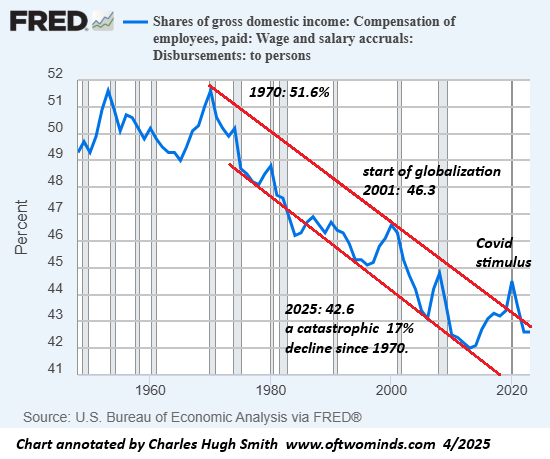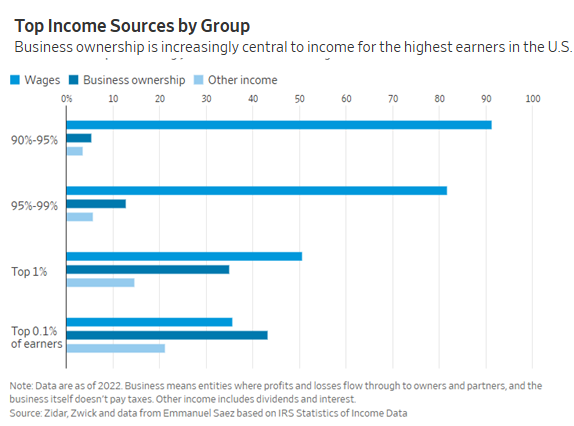Now Comes the Hard Part
That this extreme inequality is itself the primary threat to both democracy and social stability is poorly understood.
Scraped of pleasantries, the ultimate purpose of any status quo is to 1) distribute most of the economy's gains to the top tier and 2) offload the sacrifices this requires to the bottom tiers but in stealthy ways that aren't noticeable enough to spark political revolt.
The basic stealth mechanisms deployed over the past 50 years to offload the sacrifices on the bottom 90% are:
1) Reduce the share of the national income going to wages so the share going to corporate profits and finance could soar. (see charts below)
2) Place the tax burden for entitlements (Social Security and Medicare) on the wage earners while reducing the taxes levied on unearned income from the ownership of assets / capital.
3) Understate official inflation.
4) Inflate credit-asset bubbles that enriched the owners of assets at rates far above inflation.
The first dollar of every wage is taxed at 15.3% for entitlements (both the employee and employer pay 7.65%), while numerous forms of capital gains are exempt from tax. Capital is lightly taxed, earned income is heavily taxed. Wage earners lose ground, asset owners get richer. That's the net result of the taxation system.
Inflation is of course the hidden tax, but the status quo has relieved the wealthiest 10% who own most of the assets from the ravages of inflation by inflating asset bubbles which enrich the already rich at rates far above inflation. Those who own few assets absorb the losses of inflation via a slow-drip reduction in the purchasing power of their wages.
Borrowing money has always been the lowest-friction way to keep everyone happy--or at least onboard. The status quo needs enough money to fund both the gains from monopoly, tax havens, fraud and graft collected by the top few and the entitlements that keep everyone else onboard.
Alas, all good things come to an end. Interest rates fell for 40+ years, enabling more debt to be piled up without increasing the cost of servicing the debt enough to be noticeable. Now rates are rising, and despite the many claims that the Fed and other central banks can easily shove rates back to zero, the recent rise in Japanese sovereign bonds undercuts this breezy assumption that debt can be piled up indefinitely.
Japan's central bank printed money to buy the government's bonds to keep yields near zero for 30 years, but that apparently permanent solution has been revealed as impermanent.
Demographics--people living longer and the global Baby Boom retiring en masse--is pushing government spending higher as the workforce of wage earners paying most of the taxes stagnates or shrinks. Now that interest rates are in a long-term up-cycle, it's no longer possible to just borrow another few trillion dollars every year without increasing the cost of servicing all that debt to the point where the debt service starts squeezing out the spending needed to keep everyone happy.
The net result of all this is: now comes the hard part, distributing the sacrifices in ways that are finally noticeable.
The problem facing the status quo is not easily resolvable: the top few percent (corporations and the wealthiest households) who own most of the wealth have aggregated political power with their wealth, so politicians are under tremendous pressure to keep the immense river of profits, tax breaks, giveaways, graft, etc. flowing to corporations and the wealthiest few lest they throw a temper tantrum and fund a competing politico in the next election.
But the predations of the top few have already shifted most of the losses, costs and risks onto the bottom 2/3 of the populace, and so the buffers of cash, assets and credit this class has to absorb more sacrifices has already been worn thin.
The class that's doing well due to the current Everything Bubble--those in the 80% to 99% bracket--can afford to absorb some of the sacrifices, but should the bubble pop--and sadly, all bubbles pop despite herculean efforts to keep them inflated--the phantom wealth this class expected to be permanent will dissipate into thin air, leaving them less willing to absorb the scale of sacrifices needed to satisfy everyone: the politically influential top few, the technocratic class that keeps the status quo bureaucracies / institutions functioning and the bottom 2/3 who do the scutwork.
This chart below (from WSJ.com) shows that wages are still the dominant generator of income even in high-income households. Only the top 1% derive substantial shares of their income from business ownership and ownership of other assets.
In summary: the most politically influential class--those able to buy political protection from sacrifices--is the only class with the means to absorb financial sacrifices.
Politicians are caught in a bind. They need to cut spending and raise taxes lest the Good Ship Status Quo founder, but the class that is most able to absorb sacrifices also funds their campaigns.
The usual tricks that worked for the past 50 years to offload the sacrifices onto the bottom 90% wage-earner class now carry the risk of arousing political revolt.
The conventional "solution" many expect is to reduce the debt load by increasing inflation. But this only works if the bottom 90% wage-earner class receives wage increases sufficient to keep up with inflation. There is little to no evidence to support the assumption that this is likely, or even possible.
Once the Everything Bubble pops, the financial buffers of the bottom 90% wage-earner classes will thin or disappear entirely. Once this happens, their stake in the status quo changes, and they become dry kindling awaiting a spark to erupt in a political firestorm that burns down the status quo's current distribution of gains, losses, costs and risks.
Markets / economies are embedded in a social order, not the other way round. The social order has to balance the distribution fairly enough (the 80/20 Pareto Distribution comes to mind) to keep the majority from concluding there is definitive upside in overthrowing the status quo.
(Note that in the US, the bottom 90% own 32% of total household wealth, the top 10% own 68%, of which the top 1% own 31%.)

One might imagine the hyper-wealthy class who have added the entire net worth of the bottom 90% to their own hoard in the past 16 years might awaken to the systemic risks of their politically sanctioned, self-serving distribution and accept the need for some sacrifices to preserve the status quo that enriches and protects them.
But it seems they're more interested in constructing bunkers and fortresses to keep the mobs at bay. They seem to believe a fortress will protect them from the consequences of their destabilizing aggregation of wealth and power.
Nobody ever correctly predicts the spark that ignites the dry kindling of discontent into a political firestorm. The ignition event is unpredictable, for history shows that a small-scale event that would normally be inconsequential can start a political firestorm when discontent reaches levels where non-linear phase-change transitions become likely.
We can only observe the forest floor is now covered with a thickening layer of bone-dry brush and branches.
The concentration of wealth and power into the hands of the few at the expense of the many has been hidden behind the "make everyone happy" borrowing binge and the phantom-wealth created by the Everything Bubble. That this immense concentration is itself the primary threat to both democracy and social stability is poorly understood. That may change in ways few anticipate.
Wages of the bottom 90% have been declining as a share of national income for decades:

Another look at the same trend:

Income by source, the top 10% segments:

Check out my new book Ultra-Processed Life and my updated Books and Films.
Become
a $3/month patron of my work via patreon.com
Subscribe to my Substack for free
My recent books:
Disclosure: As an Amazon Associate I earn from qualifying purchases originated via links to Amazon products on this site.
Ultra-Processed Life print $16, (Kindle $7.95, Hardcover $20 (129 pages, 2025) audiobook Read the Introduction and first chapter for free (PDF)
The Mythology of Progress, Anti-Progress and a Mythology for the 21st Century print $16, (Kindle $6.95, audiobook, Hardcover $24 (215 pages, 2024) Read the Introduction and first chapter for free (PDF)
Self-Reliance in the 21st Century print $15, (Kindle $6.95, audiobook $13.08 (96 pages, 2022) Read the first chapter for free (PDF)
When You Can't Go On: Burnout, Reckoning and Renewal $15 print, $6.95 Kindle ebook; audiobook Read the first section for free (PDF)
Global Crisis, National Renewal: A (Revolutionary) Grand Strategy for the United States (Kindle $6.95, print $16, audiobook) Read Chapter One for free (PDF).
A Hacker's Teleology: Sharing the Wealth of Our Shrinking Planet (Kindle $6.95, print $15, audiobook $17.46) Read the first section for free (PDF).
Will You Be Richer or Poorer?: Profit, Power, and AI in a Traumatized World
(Kindle $3.95, print $12, audiobook) Read the first section for free (PDF).
The Adventures of the Consulting Philosopher: The Disappearance of Drake (Novel) $3.95 Kindle, $12 print); read the first chapters for free (PDF)
Money and Work Unchained $6.95 Kindle, $15 print) Read the first section for free
Become a $3/month patron of my work via patreon.com.
Subscribe to my Substack for free
NOTE: Contributions/subscriptions are acknowledged in the order received. Your name and email remain confidential and will not be given to any other individual, company or agency.
|
Thank you, Kerjanga N. ($70), for your exceedingly generous subscription to this site -- I am greatly honored by your support and readership. |
Thank you, Mark W. ($7/month), for your marvelously generous subscription to this site -- I am greatly honored by your support and readership. |
|
|
Thank you, Nikolai ($7/month), for your superbly generous subscription to this site -- I am greatly honored by your support and readership. |
Thank you, John G. ($7/month), for your splendidly generous subscription to this site -- I am greatly honored by your support and readership. |



























